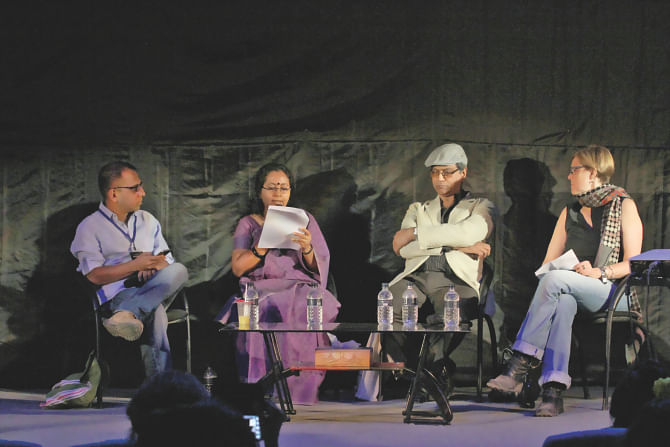The art of translation
The art of translation

“[Bangladesh] A country that was formed on the notion of language,” said Arunava Singha, one of the most prolific translators in Asia, with over thirty published translated works, when talking about the importance of translation in Bangladesh. Singha admitted that this was a little bit of an “outsider's view” but Kaisar Haq, renowned Bangladeshi writer, translator and academic, agreed with him: “Its growing body of fiction deserves to be translated.”
The final day of the Hay Festival showcased translations from the Dhaka Translation Centre workshop. During the workshop, a group of aspiring translators, in a collaborated effort, translated Bangladeshi author Shaheen Akhtar's work in her presence. It was a rare event as the writer herself could oversee if the original work was represented in its proper meaning in another language.
In this context Shaheen Akhtar, Kaisar Haq and Arunava Singha discussed the art of translation in the Common Wealth Writer's Session which was moderated by Katie Griffin.
Griffin posed the question of whether Akhtar had the Bengali reader in mind while writing her book or if she had considered the possibility of a translation and thus of having a more diverse readership. Akhtar explained that she aimed at writing a good book; and only if a book is good, can it be translated, thus reaching a wider audience in the process, she added.
According to the discussants, the presence of the author during translation enables the translator to understand the essence of the work. “Having the author by your side helps in smoothening things out,” said Shingha.
Like the translation of Akhtar's work, the translator and author oftentimes work together. However, even if many translators consult with the author, at the end of the day, the translator has the last word since he or she has obtained the copyright.
A question from the crowd regarding the significance of literary translations in a world where Google Translate exists brought some laughs from the audience in a session that was already lively and engaging. “Although it is creative, machine translation has not gotten beyond merely the content,” argued Arunava Singha.
The panelists jointly voiced the need for more translated works in an increasingly globalised world so that different cultures and streams of thought could be accessed.
Kaiser Haq said the Dhaka Translation Center aims to launch a collection of translated works at next year's Hay Fest, and he hoped there will be a steady stream of both English and Bangla translations in the near future.